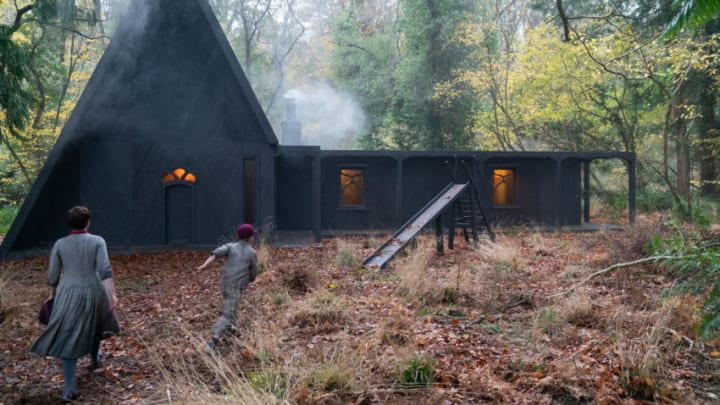Gretel and Hansel left us with a rather ambiguous ending about what the future could hold for the witch of the story. Should the film have a sequel?
The new Gretel and Hansel is a feminist reimagining of the original fairy tale story. Osgood Perkins‘s version is haunting and incredibly atmospheric. But the ending of the film was left ambiguous as to Gretel’s fate. We have a few theories to suggest.
Beware: The remainder of this article will contain spoilers for the film.
For starters, I don’t personally think this movie should have a sequel. I love the ambiguity of the ending and the fact it lets audiences draw their own conclusion. That said, I wouldn’t object to Perkins adapting more fairy tales. He has a flair for style that is well-suited to these types of movies. Imagine him getting his hands on Sleeping Beauty.
This strange and twisted story ends with Gretel ultimately stopping Holda from cooking her brother, Hansel, and forcing Gretel to eat him. It also proves that Gretel has powerful innate abilities of her own, as she moves the magical staff and murder the witch while restrained.
Ultimately, Gretel takes over Holda’s old home. She decides that Holda was right about one thing: Hansel is standing in the way of her destiny. She sends her brother on his way while retreating into the woods to learn more about her gifts.
More from Horror Movies
- Godzilla Minus One makes the King of the Monsters terrifying again
- A Creature Was Stirring scares up yuletide frights
- Pig Killer (2023): A morally ambiguous dive into shock cinema
- Onyx the Fortuitous and the Talisman of Souls: Demonically fun times
- Tobin Bell stars in new horror movie The Cello
At this pivotal moment of Gretel’s life, she will have to decide which path she will wander. Will she become evil, like Holda? Or will she evolve into something new?
The film ends with Gretel releasing the souls of all the children Holda has killed (and eaten) over the years. But when you think the film will end with a happy ending, we see Gretel’s fingers darken with soot, the same way Holda’s did.
Fingertips dyed black has often been associated with occult imagery and witchcraft in particular. It often means an association with magic, although it doesn’t always equate to dark arts or being “evil.”
In this case, however, that is what it might indicate. Especially if you make the connection of black fingers – soot – fire – the many cooked children. That seems to be the indication this particular incarnation is going for, anyway.
So, does that mean Gretel will become something twisted and sinister like the witch before her? It’s possible. After all, Holda trained her for a reason. She compared herself often to Gretel and clearly saw the same darkness echoed inside of her.

But perhaps the most credible piece of evidence is the film’s message, one that Gretel says herself — “nothing is given without something taken away.” What is her final act in the movie? She gives the children of the woods a chance to move on; she gives them peace. The instant she does that, her fingers darken. That has to mean something.
Does Gretel sacrifice her goodness with that decision to free Holda’s victims? Is the slate now clear for her to claim her own?
It seems to be what the movie is suggesting, but it could also simply mean that while Gretel does have the capacity to do evil inside of her, she can also do great things. She will have to choose which path to take, and it may not always be easy to decide, especially if you consider she sent her moral compass (Hansel) away on his own journey.
What did you think about Gretel and Hansel in theaters? What do you think about the ending? Let us know your thoughts in the comments below.
Gretel and Hansel is now playing in theaters.
